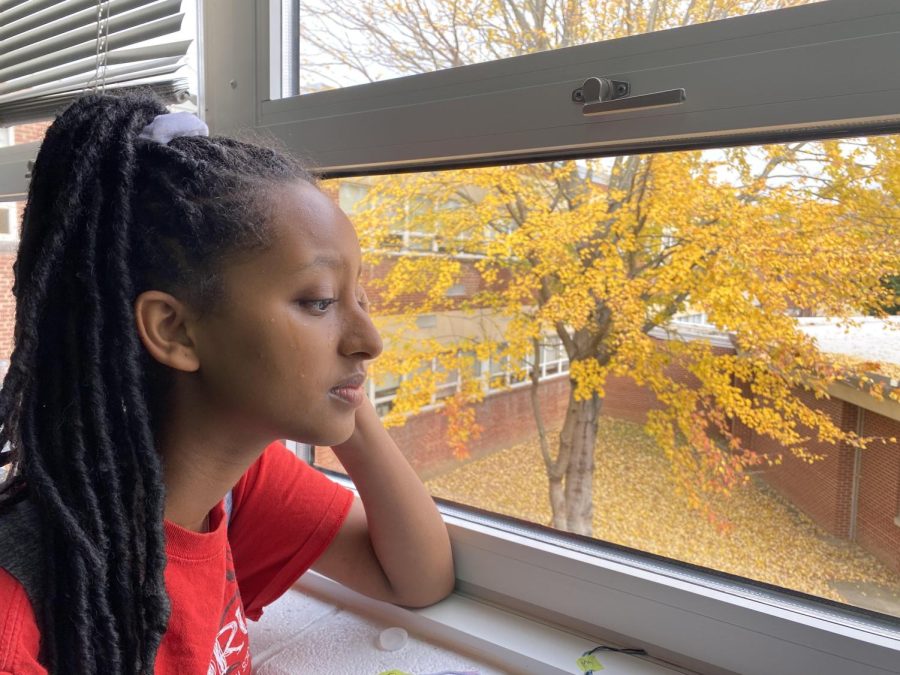Students struggle with SAD
As the colder months emerge seasonal depression takes a toll on students mental wellness
Seasonal affective disorder also known as seasonal depression or SAD, is a form of depression associated with the change of the seasons. The transition from warmer to colder months is likely to also cause a change in your mood as days begin to get shorter and colder. However, about 10 % of people are diagnosed with SAD due to the transition from colder to warmer weather. Studies show that in countries closer in proximity to the equator, summer SAD is far more common than winter SAD. It may be difficult to differentiate between winter blues and seasonal depression but there are a multitude of symptoms you can look out for.
People with SAD may experience a decrease in energy levels, sleep deprivation, sudden changes in appetite or weight, difficulty concentrating, feeling hopeless, irritability, and frequent thoughts of death or suicide. The first step to treating SAD is identification and acceptance. It is important to understand depression is not something to be ashamed of. It is quite common, SAD affects five percent of adults and is commonly identified in women compared to men. Feeling sad is normal to an extent, however if it is constant you may need to speak with a trusted adult to receive the help you need.
“Something that helps people struggling with SAD is increasing positive coping skills, such as connecting with your support systems (friends or family),”AHS school psychologist Laurie Ottehenning said.
She believes notifying the friends or family is very important so that they can do their best to support you by encouraging connection, talking and listening to that person, and just showing they care about them.
People who suffer from seasonal depression, a lack of sunlight and a problem with brain chemicals causes the hypothalamus (the region of the brain created with nervous fibers that maintains the homeostasis of the body) to not function properly. The reduced sunlight causes a drop in serotonin levels. Serotonin is the chemical in your brain that helps manage your mood. The production of melatonin is made to help make you sleep, when sunlight occurs it prompts the brain to stop in order for you to feel awake and vigilant. However since during winter there are short days and long nights, your body may get confused and produce too much melatonin which can cause you to feel sluggish or drowsy.
SAD is not an incurable disorder, those who suffer from SAD can speak with a doctor and take medication to reduce the effects. The most commonly prescribed drug for those who suffer from SAD is a selective serotonin reuptake inhibitor also known as SSRI. SSRI is an antidepressant that when used consistently can help alleviate symptoms of SAD. Along with medication, therapy is also a good method of treatment. There are different types of therapy which can help reduce symptoms such as cognitive behavioral therapy, chronotherapy, and phototherapy (also known as light therapy).
“Since SAD is a type of depression, the treatment is often the same, most people with depressive symptoms benefit from treatments like therapy and/or medication. You can also utilize any other healthy coping skills that typically help you when you are struggling- things like connecting with friends, getting enough sleep, exercising regularly, engaging in daily gratitude or mindfulness, and getting outside during the daylight,”Ottehenning said.
Natural coping skills such as talking to friends, exercising, and meditation may be easiest for younger people who suffer from SAD depending on the person. Many anti-depressants have underlying side effects which can be avoided.
“If you have noticed increased depressive symptoms in yourself, please reach out to your school counselor or one of the clinicians (school psychologist and social workers). Our student services team can try to help get you connected to mental health resources,”Ottehenning said.
Besides medication, there are other effective ways to treat SAD. For example, being exposed to sunlight more often by spending more time outdoors. Spending more time in light during the colder months might give your body the impression that you’re in summer therefore making you feel better. Beside spending time outdoors, those who suffer from SAD can also help relieve symptoms by exercising regularly and eating right. SAD might make you crave more unhealthy foods but eating healthier and exercising can improve self-esteem, alleviate social withdrawal, increase your focus and overall cause fewer mood fluctuations.
Although our current covid situation is not as bad as last year with the addition of the vaccine and updated CDC guidelines, covid is still prevalent. While it is important to limit unnecessary interaction with people, social distancing and staying home may heighten the symptoms for those who struggle with depression.
“Dealing with COVID for such a long time has increased many peoples’ feelings of anxiety and depression. Any mental health difficulties related to COVID could exacerbate SAD symptoms (like feeling hopeless, socially isolated, and unmotivated),” Ottenhenning said.
Confinement indoors typically imitates the idea of winter (since during winter people tend to stay home for warmth). It also causes people to spend more time in their beds and refrain from waking up on a regular schedule.
“In addition, there is still a lot we don’t know about ‘long COVID’ and how it impacts people’s mental health over the long run,” Ottehenning said.
Seasonal depression is a mental disorder which should be taken seriously. If you recognize symptoms in a loved one, try to initiate a conversation and see what’s going on.
You never know what’s going on in someone’s life, you can only know what they tell you so it’s important to always be kind. If you recognize symptoms within yourself, speak to a trusted adult such as the school psychologist or a counselor. They are here only to help you, the sooner you get help the better it is.
If you or someone you know is in immediate distress or is thinking about hurting themselves, call the National Suicide Prevention Lifeline toll-free at 1-800-273-TALK.

Senior Mariamawit Endalkachew is in her fourth year on the A-blast staff. She is currently pursuing the IB Diploma and is excited for the school year....







